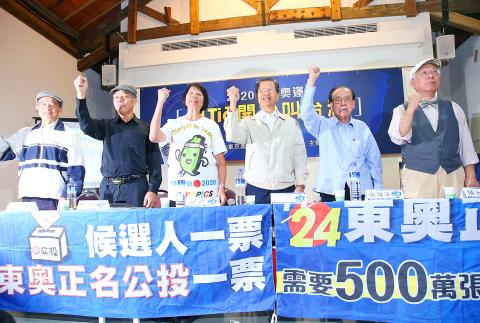A referendum to request a name change for the national team from “Chinese Taipei” to “Taiwan” for the 2020 Tokyo Olympics would not affect athletes’ right to compete in the Games, a coalition of civic groups that launched the referendum said yesterday.
“Our proposed referendum is in line with the Olympic Charter, as well as the Lausanne Agreement, so it would not cause the Chinese Taipei Olympic Committee [CTOC] to be suspended or lose membership, or anything that could affect our athletes’ rights,” said George Chang (張燦鍙), one of the campaigners for the referendum.
The referendum, one of 10 to be held on Saturday alongside the nine-in-one elections, has drawn repeated warnings from the International Olympic Committee (IOC) since May, allegedly due to pressure from China.

Photo: CNA
The IOC said that it would not approve the name change due to the Lausanne Agreement, an arrangement it signed with the CTOC in 1981 that requires Taiwan to compete under the name “Chinese Taipei” and fly the CTOC flag at international sports events.
In a letter sent to the CTOC and the Sports Administration on Friday, the IOC reiterated that the team’s name is determined by the 1981 agreement, saying that: “Any attempt to exercise undue pressure on the CTOC to breach the 1981 agreement and/or to act against the decision of the IOC Executive Board would be considered as external interference, which might expose the CTOC to the protective measures set out in the Olympic Charter.”
While the letter raised concerns that the referendum could lead to athletes being banned from competing in the Games, Chang said that would be against the charter.
The IOC’s letter should be understood as “an expression of opinion, rather than a formal ruling on the matter,” he said.
“According to the Olympic Charter, they do not have the power to reject an application before it is submitted and we have the right to apply for a name change,” he added.
Campaign convener Yang Chung-ho (楊忠和), former director-general of the Sports Administration, said that he has “read the entire Olympic Charter and did not find any rule on any page that bans a name change.”
“There is no way submitting an application would affect the rights of athletes. Unless the CTOC pretends to be the victim and asks the IOC to suspend it, the referendum would not lead to its suspension,” he added.
Online news outlet Taiwan People News chairman Chen Yung-hsing (陳永興) said that past instances have shown that the IOC prioritizes athletes’ rights over their national Olympic committee.
When former Brazilian Olympic Committee president Carlos Nuzman was charged with corruption, the IOC suspended the body, but the right of Brazilian athletes to compete in events was unaffected, Chen said, adding: “Taiwanese athletes would absolutely not be banned from competing in the Games.”
“We are promoting the referendum to protect the dignity of Taiwanese athletes,” he said. “When we travel abroad, who would identify themselves as coming from ‘Chinese Taipei?’ The answer is always Taiwan.”

US President Donald Trump said "it’s up to" Chinese President Xi Jinping (習近平) what China does on Taiwan, but that he would be "very unhappy" with a change in the "status quo," the New York Times said in an interview published yesterday. Xi "considers it to be a part of China, and that’s up to him what he’s going to be doing," Trump told the newspaper on Wednesday. "But I’ve expressed to him that I would be very unhappy if he did that, and I don’t think he’ll do that," he added. "I hope he doesn’t do that." Trump made the comments in

Japanese footwear brand Onitsuka Tiger today issued a public apology and said it has suspended an employee amid allegations that the staff member discriminated against a Vietnamese customer at its Taipei 101 store. Posting on the social media platform Threads yesterday, a user said that an employee at the store said that “those shoes are very expensive” when her friend, who is a migrant worker from Vietnam, asked for assistance. The employee then ignored her until she asked again, to which she replied: "We don't have a size 37." The post had amassed nearly 26,000 likes and 916 comments as of this

Tourism in Kenting fell to a historic low for the second consecutive year last year, impacting hotels and other local businesses that rely on a steady stream of domestic tourists, the latest data showed. A total of 2.139 million tourists visited Kenting last year, down slightly from 2.14 million in 2024, the data showed. The number of tourists who visited the national park on the Hengchun Peninsula peaked in 2015 at 8.37 million people. That number has been below 2.2 million for two years, although there was a spike in October last year due to multiple long weekends. The occupancy rate for hotels

A cold surge advisory was today issued for 18 cities and counties across Taiwan, with temperatures of below 10°C forecast during the day and into tonight, the Central Weather Administration (CWA) said. New Taipei City, Taipei, Taoyuan and Hsinchu, Miaoli and Yilan counties are expected to experience sustained temperatures of 10°C or lower, the CWA said. Temperatures are likely to temporarily drop below 10°C in most other areas, except Taitung, Pingtung, Penghu and Lienchiang (Matsu) counties, CWA data showed. The cold weather is being caused by a strong continental cold air mass, combined with radiative cooling, a process in which heat escapes from